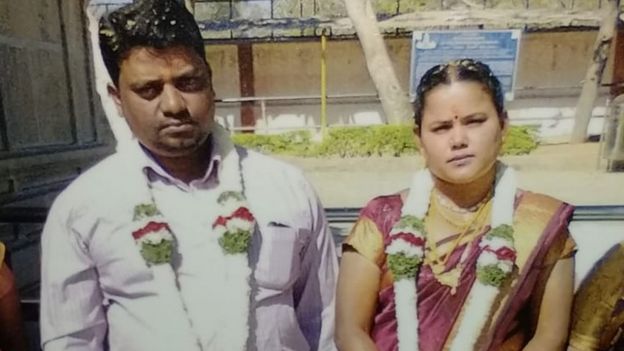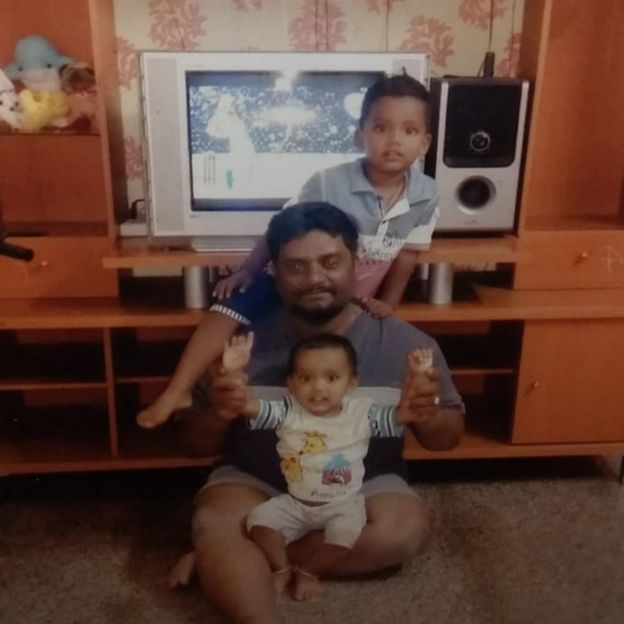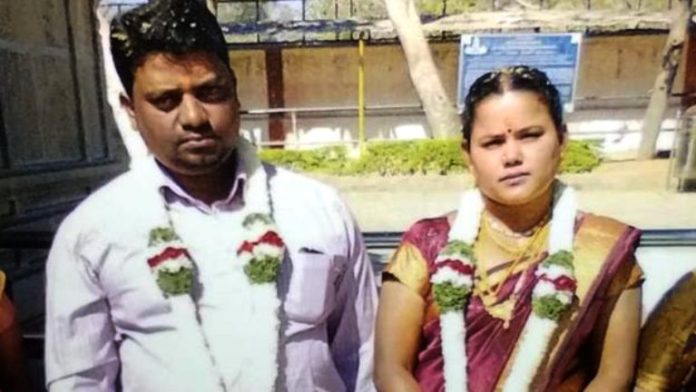The last time Mary Jayaseelan spoke to her husband Rajesh, he was about to be hooked up to a ventilator in a Covid ward.
Rajesh was being treated in Northwick Park Hospital in London, the city where he worked as an Uber driver for most of the year. Mary was 5,000 miles away in their family home in Bangalore, India, with their two young sons. Until that point he had repeatedly told her he would be fine, that he was feeling ill but she was not to worry, he’d get better – at 44 years old, he was young and otherwise healthy.
But on that call, he broke down and admitted: “Mary, I’m feeling a bit scared.”
Rajesh Jayaseelan died the following day.
Rajesh and Mary got married on 24 February 2014, and rented a home in Hulimavu, south Bangalore, that they shared with his 66-year-old mum. For most of the year, Rajesh rented a room in Harrow, north London and drove an Uber vehicle in the city. He’d work from late in the evening to the early hours of the morning – the busy hours – so he could save enough money to spend a few months with his family in India.
He enjoyed working as a driver, although he didn’t realise that his precarious gig economy job would leave him vulnerable in the global health crisis that would later emerge.
“He’d been living in London on-and-off for 22 years, and would come back to India for a few months at a time,” Mary says. “He loved London. He always used to talk to me about how beautiful London was, and so clean. I’ve never been to London, so he would describe it to me.”
They were very happy. Rajesh loved his wife, and playing with their two sons, aged six and four. When he wasn’t in India he would video-call them every day.
“He was also a really good singer,” Mary says, full of pride. “He sang a lot of Hindi songs.”
He was also a “humble, gentle person” his close friend Sunil Kumar adds. Sunil and Rajesh first met in 2011 – they were both from Bangalore, so mutual friends there put them in touch when Sunil moved to the UK. They would help each other navigate the UK’s various bureaucratic systems, loaned each other small amounts of money when needed, and Sunil and his wife would have Rajesh over for meals at their home in Hertfordshire – sending him back with several days’ worth of leftovers of delicious South Indian food.
Although Rajesh loved London, he didn’t plan to stay forever – he wanted to be reunited with his family in India. Renting their home in Hulimavu was relatively expensive, so during his last stay in Bangalore at the end of 2019, he and his wife took out a loan and bought land to build their own home. The loan was no problem, they thought – Rajesh would go back to London and put enough money aside to pay it off. The next time he travelled to Bangalore, he told his wife, it would be for good.
He came back to London on 15 January. Less than two weeks later, the first cases of coronavirus were reported in the UK.

Although the virus had reached Britain, at this point Rajesh wasn’t too worried. Shops and restaurants were still open, people were still going into work and then going out. For everyone, including Uber drivers, it was business as usual, and not much changed for another month.
Then March came around, and the virus was passing from person to person within the UK. The number of cases – and, by now, deaths – was increasing every day. People were told to self-isolate for seven days if they had any symptoms – even mild ones, such as a fever or a persistent cough.
On 23 March, Prime Minister Boris Johnson announced a nationwide lockdown lasting an initial three weeks, meaning that most businesses would close, and people would only be allowed outside for one form of exercise a day and for essential trips to the shops, unless they were considered “essential” workers.
Like many Uber drivers, Rajesh continued to work at first, but he quickly developed flu-like symptoms and had to stop. His last job was on 25 March – a drop-off at Heathrow Airport.
His symptoms became much worse, and he was admitted to the hospital with dehydration. While there, he was tested for the coronavirus.
It came back positive.
Staff told Rajesh to go home, self-isolate, and to come back if his symptoms got worse. He did as he was told, and went home to his room. But things were about to get even worse.
“The landlord sent Rajesh out of the house for something, and when he came back the landlord had changed the locks, so he couldn’t get in,” Mary says. “He tried knocking on the door and asking the landlord to speak to him, but he wouldn’t open the door.”
His landlord didn’t know about his positive diagnosis – but he told him that, as an Uber driver, he might bring the coronavirus back into the house, and that it wasn’t a risk he was willing to take.
With nowhere else to turn, Rajesh was forced to sleep in his car for several nights.
“He had no food in there, nothing to eat at all,” Mary says.
At this point he called his friend Sunil for advice.

“That was the last call he made to me,” Sunil says. “He didn’t go into details about what was happening to him, but because I work in the NHS, he was asking me questions like ‘How safe are we’, ‘Is it better to go to India’… things like that. He was asking me if I knew any routes, if there was any possible way he could go – he wanted to go to India and be with his family. But by that time there was a complete lockdown in India too.”
Sunil told him the best thing to do would be to stay at home, not to work, and to look into the financial support for self-employed workers the government had just announced, or the 14 days’ assistance offered by Uber.
Rajesh agreed, and explained he needed to find a new place to live because his landlord said he was high risk. But, Sunil says, he didn’t say that he’d already been kicked out: “He may have been embarrassed.”
Rajesh then went back to trying to call his landlord to plead with him to let him stay. There was no answer.
After days of searching, he eventually found another room in a shared house in Harrow. The new landlord made him pay £4,000 upfront – money he didn’t have, and Mary says he had to borrow.

